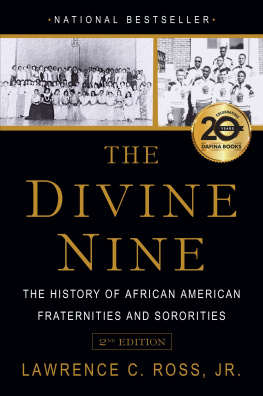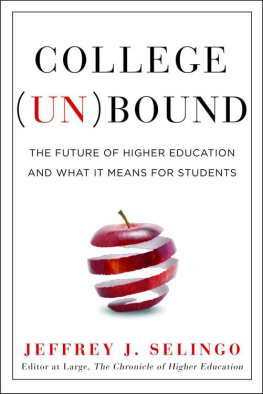Blackballed
The Black and White Politics of Race on Americas Campuses
Lawrence Ross
St. Martins Press
New York

Thank you for buying this St. Martins Press ebook.
To receive special offers, bonus content, and info on new releases and other great reads, sign up for our newsletters.

Or visit us online at us.macmillan.com/newslettersignup
For email updates on the author, click here.
The author and publisher have provided this e-book to you for your personal use only. You may not make this e-book publicly available in any way. Copyright infringement is against the law. If you believe the copy of this e-book you are reading infringes on the authors copyright, please notify the publisher at: us.macmillanusa.com/piracy .
For my beloved son, Langston Ross... who I wish the world
A Century of Isolated Incidents
Spanish philosopher George Santayana, a Harvard class mate of African American philosopher W. E. B. Du Bois, was most famous for stating, Those who cannot remember the past are condemned to repeat it. The phrase has been the go-to refrain directed toward anyone who lacks the depth or tenacity to dive into the tedious waters of true historical analysis. For the most part, the observation has morphed into clichsomething said over a couple of drinks or while watching Jeopardy! as you sit on the couch. When it comes to America and race, Im predisposed to another quote by Santayana, one that I think more fully explains white Americas collective historical amnesia regarding the realities of racism and the effects of brutality on African Americans, past and present:
History is nothing but assisted and recorded memory... Memory itself is an internal rumor; and when to this hearsay within the mind we add the falsified echoes that reach us from others, we have but a shifting and unseizable basis to build upon. The picture we frame of the past changes continually and grows every day less similar to the original experience.
For the past 400 years, African Americans tried to assist white America in recording a memory of racism, often to no avail. White America clings stubbornly to a collective narrative, what Gore Vidal famously called the United States of Amnesia. That amnesia acts like a cloak of ignorance, warm and embracing enough to make the issue of racism a mental no-go zone for those who refuse to acknowledge its existence.
In a postCivil War world, decade after decade, African Americans have done their best to elicit sympathy for their struggle against systemic white racism. In explaining the day-to-day indignities of state-sponsored second-class life under Jim Crow degradation, along with the domestic terrorism that resulted in thousands of African Americans throughout the United States being lynched for the most captious of reasons, African Americans pointed at the racism and said, Look.
Today, systemic and institutional racism still plagues African Americans, long after the Colored Only signs have been taken down. African Americans are primarily the ones burdened with the task of fixing a race problem they didnt produce or perpetuate, while white America continues to say, I dont see it.
Even when forced to confront overt racism, white America has been slow, reluctant, and dishonest in recounting that memory, a memory that is deep in their guts, a memory that they know is true. As individuals, white Americans have learned that they can deflect, defuse, and delude as a way to maintain the charade: This is not a race issue. The people who did this are jerks, but this is not about race; This may have been insensitive, but can we move on from this and get back to normal?; Because youre talking about racism, youre being racist, and thats the reason why we cant get beyond race in this country; This is not who I am. This is an isolated incident.
As the unelected governing body for the purpose of evaluating the validity of racism, white America consistently discounts black witnesses to racism as unreliable, as in youre playing the race card, and the falsifying echoes are often those black sophists who ply their trade on Fox News, or for the Republican Party, eager to comfort the uninformed. Their message? No matter what authentic black voices say, nothing about white racism is worth taking up space in the collective white American memory: Black people who talk about racism are just trying to be the victim. And that in itself is a form of racism; Everything is just fine. Just fine; Just dont think about racism, and dont think about color. Feel free to maintain the amnesia.
But everything isnt fine.
Most African Americans live in a world where white racism is an omnipresent entity, an obstacle they attempt to navigate while becoming highly successful, exceedingly mediocre, or abject failures. But pointing out the realities of white racism to America as a black person who lives them, and then having that reality dismissed unheard, logically makes black people question their sanity. When racial inequities around housing, education, jobs, wealth, health care, and a thousand other categories are quantifiably tilted toward the benefit of white Americans, often because of overtly racist public policy, why did a 2013 Rasmussen poll show that 49 percent of white Republicans viewed African Americans, and not themselves or other white Americans, as racist?
Its intentional delusion.
And for most white Americans, the delusion begins with the idea that every child in America begins on an equal footing with every other child, regardless of race. The formula for success, and the formula most often preached to African Americans, is work hard, carry on with your life as though you believe wholeheartedly in the American Dream, and with a little bit of pluck and ambition, you too can go far. And for many, including African Americans, you can go far. Failure isnt a fait accompli when it comes to an African Americans life destiny.
But its also important to note that racism isnt just some thing that you overcome. Its omnipresent, like a sea of shit in which you swim, always stinking no matter how many showers you take. But to white America, the inequities of society created by racism are trivial when compared with the opportunities America allows everyone. Racism is simply, in the eyes and ears of white America, an unfortunate but inconsequential aspect of life, like being short or losing ones hair at an early age. An aspect of life to be discounted where the presence of racism is more than balanced by the multitude of mitigating factors.
I dont see color is the common refrain for those trying to deflect statements about racism, not knowing that what theyre really saying is, My learned racism, along with my participation and benefit from living in a racist society, has an effect on how I treated you. So in order to counter that, I must pretend that I dont see you or the essence of who you are. And if I dont see you, then I can ignore the facts around your color, and in my mind, the problem goes away.
Racism. Its the great American cat-and-mouse game, with African Americans playing the role of the mouse, desperate to escape from the maze and white societys deadly paw. Racisms genius is its ability to arbitrarily change rules, impact lives, and yet disavow itself, along with its effects on victims. It is the Keyser Soze, or more recently, the Rachel Dolezal, of societal maladies. Real to some, unreal to others, camouflaged in many layers of white privilege, yet always staring us right in the face.
Next page







